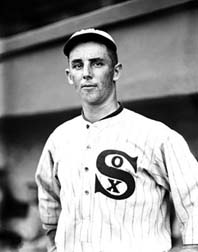Lefty Williams
| Lefty Williams | |||
|---|---|---|---|
 |
|||
| Pitcher | |||
|
Born: March 9, 1893 Aurora, Missouri |
|||
|
Died: November 4, 1959 (aged 66) Laguna Beach, California |
|||
|
|||
| MLB debut | |||
| September 17, 1913, for the Detroit Tigers | |||
| Last MLB appearance | |||
| September 25, 1920, for the Chicago White Sox | |||
| MLB statistics | |||
| Win-loss record | 82–48 | ||
| Earned run average | 3.13 | ||
| Strikeouts | 515 | ||
| Teams | |||
| Career highlights and awards | |||
|
|||
Claude Preston "Lefty" Williams (March 9, 1893 – November 4, 1959) was an American pitcher in Major League Baseball. He is probably best known for his involvement in the 1919 World Series fix, known as the Black Sox scandal.
Williams was born in Aurora, Missouri, to William and Mary Williams. He began his major league career on September 17, 1913, with the Detroit Tigers.
His breakthrough season came in 1915, while with the Salt Lake City Bees of the Pacific Coast League. That year, he pitched 418.2 innings, leading the league in wins (33) and strikeouts (294), while featuring mostly his mid-90s fastball and swooping curve. His contract was then purchased by the Chicago White Sox.
With the White Sox, Williams settled into the starting rotation and helped the team win the pennant in 1917, going 17–8. After spending 1918 working in Navy shipyards, he came back strong in 1919 with his greatest performance, going 23–11 with a 2.64 earned run average. The White Sox again won the American League pennant. However, before that year's World Series, he got caught up in the Black Sox scandal when teammate Chick Gandil offered him $10,000 to lose his starts. Williams only received $5,000, half of what he was promised, but that was still almost double his 1919 salary of $2,600.
In the series, Williams went 0–3, with an earned run average of 6.63. His three losses were a World Series record. That was tied in the 1981 Series when George Frazier lost three games. Eight Men Out author Eliot Asinof wrote that Williams eventually turned against the fix as he prepared for his final Series start; Asinof later admitted that this particular anecdote was made-up.
...
Wikipedia
